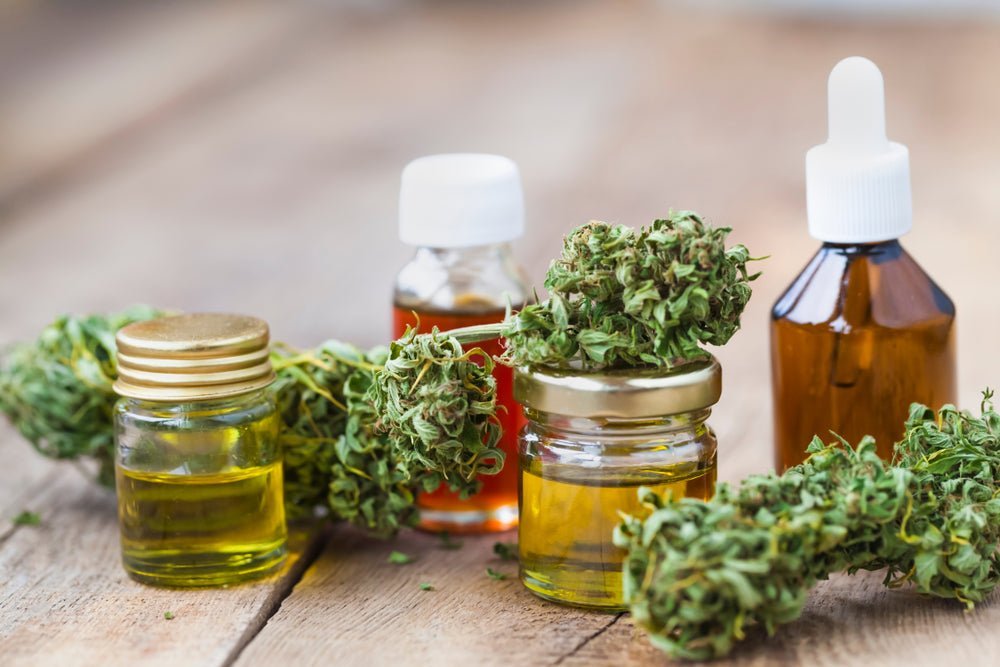Recent posts
-

-
 What Are THCa Diamonds?October 14, 2025
What Are THCa Diamonds?October 14, 2025 -
 Delta 9 Gummies GuideOctober 8, 2025
Delta 9 Gummies GuideOctober 8, 2025 -
 Head High vs Body High: A Guide to Cannabis EffectsOctober 1, 2025
Head High vs Body High: A Guide to Cannabis EffectsOctober 1, 2025 -
 What is THCA Crumble?September 22, 2025
What is THCA Crumble?September 22, 2025 -
 10 Ways to Elevate Self-Care Awareness MonthSeptember 14, 2025
10 Ways to Elevate Self-Care Awareness MonthSeptember 14, 2025

HHC vs THC: What's the Difference?
By Zero Point
Table of Contents
The world of cannabis is vast and intricate, with a spectrum of compounds each possessing unique characteristics and effects. Among these, Tetrahydrocannabinol (THC) has long been the most renowned for its psychoactive properties, often associated with the "high" experienced in cannabis use. However, in recent years, another compound has emerged on the scene: Hexahydrocannabinol (HHC).
Understanding the differences between HHC and THC is crucial for anyone involved in the cannabis industry, whether as a business owner, researcher, or consumer. This blog aims to provide an in-depth comparison of HHC and THC, exploring their chemical structures, effects on the body, legal status, and their impact on the cannabis market.
As we delve into the intricacies of these compounds, we aim to equip readers with the knowledge needed to navigate the ever-evolving landscape of cannabis. Whether you're considering the use of these compounds for recreational purposes or seeking to understand their potential in the cannabis industry, this comprehensive guide will serve as your educational foundation.
Historical Background
The relationship between humans and cannabis dates back thousands of years, intertwined with our cultural, medicinal, and recreational history. Cannabis has been revered, prohibited, and scrutinized, reflecting a journey as complex as the plant itself. Central to this story are the discoveries of its compounds, including Tetrahydrocannabinol (THC) and, more recently, Hexahydrocannabinol (HHC).
THC was first isolated and synthesized in the 1960s by Israeli chemist Raphael Mechoulam, marking a watershed moment in cannabis research. This discovery not only unveiled the compound responsible for the psychoactive effects of cannabis but also opened the doors to decades of scientific inquiry into cannabinoids.
HHC, on the other hand, is a newer addition to the cannabinoid family. Its existence was known for some time, but only in recent years has it gained prominence. Unlike THC, which is naturally occurring, HHC is typically synthesized through a hydrogenation process, similar to how margarine is made from vegetable oil. This process increases the stability of the molecule, potentially impacting its shelf life and how it interacts with the body.
The legal landscape surrounding cannabis and its compounds has been tumultuous. THC, due to its psychoactive properties, faced widespread prohibition across the globe. However, recent years have seen a dramatic shift, with many regions legalizing or decriminalizing cannabis, especially for medical use. HHC's legal status, being relatively new and less understood, remains a complex and evolving issue.
Understanding the historical context of HHC and THC is essential for grasping their current roles in the cannabis industry. Their paths from discovery to present-day relevance tell a story of scientific achievement, societal attitudes, and regulatory challenges – a backdrop against which the modern cannabis narrative is still being written.
Chemical Structure and Properties
The molecular world of cannabis compounds is diverse and complex, with slight variations in structure leading to significantly different effects. Two such compounds, HHC and THC, illustrate this point vividly. While they share similarities, their distinct chemical structures give rise to unique properties and interactions within the body.
THC: The Well-Known Cannabinoid
Tetrahydrocannabinol, or THC, is the most well-known cannabinoid due to its potent psychoactive effects. Its molecular structure contains a cyclic ring with a particular arrangement of carbon and hydrogen atoms, which is crucial for its ability to bind to CB1 receptors in the brain. This binding is responsible for the "high" associated with THC, including feelings of euphoria, altered perception of time, and enhanced sensory experiences. THC is also known for its therapeutic benefits, such as pain relief, nausea reduction, and appetite stimulation.
HHC: The Hydrogenated Cousin
Hexahydrocannabinol (HHC), although less studied, has a fascinating chemical story. HHC is essentially a hydrogenated form of THC. Through a process called hydrogenation, hydrogen atoms are added to THC's structure. This process alters the double bonds in the THC molecule, creating a more saturated compound. The resulting molecule, HHC, is more stable and less prone to oxidation. This stability could mean a longer shelf life and possibly different pharmacological effects compared to THC.
Comparing Effects and Potency
The differences in the molecular structures of HHC and THC also impact their potency and effects. HHC is often reported to have similar psychoactive effects to THC, but there is anecdotal evidence to suggest that its impact might be slightly milder. This could be due to the way HHC interacts with the body’s endocannabinoid system, potentially binding less efficiently to the CB1 receptors compared to THC.
Therapeutic Potentials
Both HHC and THC have therapeutic potentials, although THC currently has more documented medical applications due to its longer history of study. THC is used in various medical contexts, including pain management, appetite stimulation in chemotherapy patients, and as a treatment for certain symptoms of multiple sclerosis. HHC's therapeutic potential, while promising, is still under investigation, with research focusing on understanding its effects and efficacy.
Understanding the chemical structure and properties of HHC and THC is crucial for grasping how these compounds interact with the body and their potential applications. While they share a common lineage, their distinct differences pave the way for diverse experiences and uses.
Effects on the Body
The impact of cannabinoids like HHC and THC on the human body is a subject of ongoing research and fascination. Both compounds interact with the body's endocannabinoid system (ECS), but in slightly different ways, leading to varied effects and experiences.
The Endocannabinoid System: A Brief Overview
The ECS is a complex network of receptors, endocannabinoids (compounds produced by our bodies that are similar to cannabinoids), and enzymes. It plays a vital role in maintaining homeostasis, regulating functions such as mood, appetite, pain sensation, and memory. The primary receptors in the ECS are CB1 and CB2 receptors. CB1 receptors are mainly found in the brain and central nervous system, while CB2 receptors are more prevalent in peripheral organs and cells associated with the immune system.
THC and the ECS
THC is known for its strong affinity for the CB1 receptors. When THC binds to these receptors, it alters normal brain communication and causes the well-known psychoactive effects of cannabis, such as euphoria, altered perception, and relaxation. Additionally, THC's interaction with the ECS contributes to its therapeutic effects, like pain relief and nausea reduction, making it a valuable compound in medical cannabis treatments.
HHC's Interaction with the ECS
HHC, while similar in structure to THC, has a unique interaction with the ECS. It is believed to bind to both CB1 and CB2 receptors, but possibly with a different affinity or efficacy compared to THC. This variation in interaction could explain why some users report that HHC provides a milder psychoactive experience than THC. However, comprehensive studies on HHC's binding mechanisms and effects are still in their infancy, leaving room for more in-depth exploration.
Psychoactive Effects and Medical Benefits
Both THC and HHC produce psychoactive effects, though anecdotal reports suggest that HHC's effects may be less intense. This aspect could make HHC appealing to individuals seeking milder experiences or those sensitive to THC's strong psychoactivity.
In terms of medical benefits, THC is utilized in treating conditions like chronic pain, glaucoma, insomnia, and muscle spasticity. HHC's potential medical applications are still being uncovered, with initial indications suggesting it may possess analgesic and anti-inflammatory properties.
Understanding the effects of HHC and THC on the body is crucial for both recreational users and medical patients. It informs dosage, expected experiences, and potential therapeutic applications, playing a significant role in the responsible and effective use of these compounds.
Legal Status and Accessibility

The legal landscape for cannabis and its derivatives, including HHC and THC, is a patchwork of regulations that vary widely across different regions and countries. Understanding these legal nuances is essential for both consumers and industry participants.
THC: Navigating a Complex Legal Environment
THC's legal status has been a contentious issue for decades. In the United States, for instance, marijuana (which contains THC) is illegal under federal law but has been legalized for medical and/or recreational use in several states. This creates a complex legal environment where federal and state laws can conflict. In other countries, the legal status of THC ranges from fully illegal to completely legal or decriminalized, often with specific regulations around its medical use.
The legality of THC directly impacts its accessibility. In regions where it is legal, THC products are available through licensed dispensaries or pharmacies, with regulations governing their production, distribution, and sale. In contrast, in areas where THC is illegal, it remains accessible only through unregulated markets, posing risks due to lack of quality control and potential legal consequences.
HHC: A Newer Compound on the Legal Radar
HHC's legal status is less clear than that of THC. As a relatively new compound in the cannabis market, it often falls into a legal gray area. In some jurisdictions, HHC is not explicitly illegal due to its synthetic nature and differences from THC. However, this does not necessarily mean it is legal; rather, it may not yet be regulated or recognized by existing cannabis laws.
This ambiguity affects HHC's accessibility. In places where it is not explicitly banned, HHC may be available more freely than THC, often found in online stores or specialty shops. However, the lack of regulation raises concerns about product quality and safety.
The evolving legal status of HHC and THC highlights the need for ongoing monitoring of cannabis laws and regulations. As these laws change, so too will the accessibility and regulation of these compounds, with significant implications for consumers, healthcare providers, and the cannabis industry.
Industry Perspectives
The cannabis industry is dynamic and rapidly evolving, with the emergence of new compounds like HHC reshaping market trends and consumer preferences. Both HHC and THC play significant roles, but their impact and reception within the industry vary.
THC: The Established Market Leader
THC has long been the cornerstone of the cannabis market, driving both medical and recreational industries. Its well-documented effects and widespread consumer recognition make it a staple product. Businesses focusing on THC products benefit from a mature market with established consumer bases, but they also face challenges such as intense competition, stringent regulations, and the need for continuous innovation in product offerings.
HHC: Emerging Player with Growing Interest
HHC, being a newer entrant, is carving out its niche. Its novelty and purported milder effects compared to THC are appealing to a segment of consumers seeking different experiences. This interest is driving cannabis businesses to explore HHC-based products as a means of diversifying their product lines and capturing new market segments.
However, HHC's ambiguous legal status poses challenges for businesses. Companies venturing into the HHC market must navigate unclear regulatory frameworks, which can vary significantly across regions. Despite these challenges, the interest in HHC is growing, with industry analysts predicting a surge in demand as more consumers become aware of its existence and properties.
Future Trends and Predictions
The future of HHC and THC in the cannabis industry is likely to be influenced by several factors, including legal developments, scientific research, and consumer trends. Continued research into HHC could solidify its position in the market, especially if its potential benefits and safety profile are more clearly defined. For THC, ongoing legalization efforts in various countries and states could further expand its market.
Additionally, consumer preferences for product types (e.g., edibles, oils, flowers) and potency will guide the development of new cannabis products containing THC and HHC. The industry's ability to adapt to these preferences, coupled with regulatory compliance, will be key to the sustained growth and success of businesses dealing with these compounds.
Recreational Use Considerations
For recreational users, the choice between HHC and THC involves various factors, including desired effects, potency, and legal considerations. Both compounds offer unique experiences, and understanding these can help users make informed decisions.
The Appeal of THC: Potency and Effects
THC is renowned for its potent psychoactive effects, which is a major draw for many recreational users. It offers a range of experiences, from euphoria and relaxation to heightened sensory perception and creativity. The intensity of these effects can vary based on the strain of cannabis, the THC concentration, and the individual's physiology and tolerance levels.
THC's popularity also stems from its versatility. It is available in various forms, including smokable flower, edibles, oils, and concentrates, allowing users to choose their preferred method of consumption. However, the potency of THC also means that users need to be cautious, especially those new to cannabis or with lower tolerance levels. Overconsumption can lead to unpleasant experiences, such as anxiety or paranoia.
HHC: A Milder Alternative?
HHC is often described as a milder alternative to THC, potentially offering a less intense psychoactive experience. This can be appealing to those who find THC's effects too strong or who are looking for a more subtle experience. The reported effects of HHC include relaxation and mild euphoria, but without the intensity often associated with THC.
However, due to its relative newness and lack of extensive research, the exact effects of HHC can vary, and there is less information available about its long-term impact. This uncertainty means that recreational users considering HHC should proceed with caution, starting with low doses and gradually increasing as they become more familiar with its effects.
Safety and Responsible Use
Regardless of whether users choose HHC or THC, safety and responsible use are paramount. This includes understanding the legal status of these compounds in their region, purchasing from reputable sources, and being aware of individual tolerance levels. It's also important for users to be informed about potential side effects and to consume in a safe environment.
For both HHC and THC, responsible use also means being aware of the potential for impaired judgment and coordination, especially when driving or operating machinery. As the cannabis industry continues to evolve, education on safe and responsible use remains a crucial aspect for recreational users.
Conclusion
In this exploration of HHC versus THC, we've delved into various aspects of these intriguing cannabis compounds. From their historical backgrounds and chemical properties to their effects on the body, legal status, and industry perspectives, it's clear that both HHC and THC have unique roles in the evolving narrative of cannabis.
Key Takeaways
- Chemical Structures and Effects: THC, known for its psychoactive properties, has a well-established place in both recreational and medical contexts. HHC, while similar to THC in structure, offers a potentially milder experience, though its full effects and benefits are still under investigation.
- Legal and Accessibility Issues: The legal status of THC is more defined but varies widely by region, impacting its accessibility and use. HHC, being newer and less understood, often exists in a legal gray area, making its market presence unpredictable but growing.
- Recreational Use and Safety: For recreational users, THC offers a potent experience, while HHC might be a milder alternative. In either case, understanding potency, starting with lower doses, and ensuring safe consumption are crucial.
The Future of Cannabis Research and Consumer Education
Looking forward, the cannabis industry and the body of research surrounding it are poised for significant growth. Continued studies into compounds like HHC and THC will further our understanding of their potential benefits, risks, and applications. This research is not only crucial for medical and scientific advancement but also for informing policy and regulation.
Consumer education will play a vital role in this future. As the market expands and new products emerge, educating users about safe and responsible consumption, understanding potency, and staying informed about legal changes will be key to fostering a responsible and informed cannabis community.
In conclusion, whether you're a recreational user, a medical patient, or an industry professional, staying informed and adaptable is vital in the ever-changing landscape of cannabis. HHC and THC, with their distinct characteristics and potentials, exemplify the diversity and complexity of this fascinating plant.









